Album
«Det som bølger uti havet» // «What waves might bring»
A fresh breeze is coming and you are to put out to sea. At home the near and the dear are awaiting. Songs about love, missing somebody, evil deeds, but also how you would like everything to get better.
The Viking Age is often characterized by thoughts focusing on freedom, but also how you deeply feel that you are connected to a context. What you do really does matter, also in the realm of the gods.
This is an album which is trying to catch a perspective on The Viking Age, that deals with the thought on how you would act and think according to kin traditions. No one knows how the music would have sounded. We have only traces to follow.
Target audience
Individuals, museums, libraries, associations and media throughout the world. There is a search going on for serious music that deals with The Viking Age.
About the songs
Sigurdskvadet // The Sigurd Kvaed, The Faroe Islands
The Ballad dance is an uninterrupted tradition since the 17th century. However, some sources suggest that it can be traced to the 13th century, and it most certainly is significantly older. The contents of the lyrics in «The Heroic Poems» certainly goes back to the 5th century BC.
King Orfeo
These are lyrics in the old and extinct language of Norn. The language was descended from Old Norse with some later additions from Scots, itself an ancient variety of English and it died out in the late 18th century. Also the Shetland dialect is used. In the 1880s Andrew Coutts on the island of Unst sang this song. In 1947 John Stickles made some records. It is commented in B. H. Bronsons: The Traditional Tunes of The Child Ballads, vol. 1. In the 14th century there was written a Romance, built on the Classical Greek myth of Orpheus and Eurydice. Both the English and the Nordic versions, in contrast to the (Classical) (Antique) version, have a happy ending.
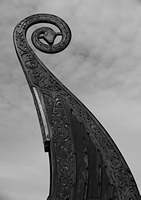
Skeppskväde // The Ship’s Kvaed
The lyrics are in the versification of «Ljodahattur». It is written by Hans Lagerhall. There were several versifications during the Viking Age, whereof the most difficult and intricate was the «Drottkvaett». They used an expression called «kenning». «The Wolf of The Sea» would in this way mean a Viking Ship. You used this way of expressing yourself in especially grand social contexts. Social status and poetry was about showing that you knew the very most of the world and its whereabouts; and then being able to construct a poem in a certain versification, expressed as personal as possible.
The rest of the songs are composed by Rolf Agaton
From a musicological perspective, with a connection to the narrative tradition and the myths from the Viking Age, here is a scenario of instrumental music along with singing and lyrics, where we are trying to illustrate visions of a time before Christianity came to Scandinavia.

Unns sang // Unn’s Song
Unn’s life (all texts about Unn are inspired from the stories about her authentic life) turns out to be quite hazardous. Moving very early in her life to the Hebrides, due to lack of mutual confidence between her father and King Harald The Fairhaired, she then experiences a broken marriage with the King of Dublin, Olav Hvite. Finally, she gather’s all her kin and thralls, builds a ship during autumn and winter, and eventually moves to Iceland.
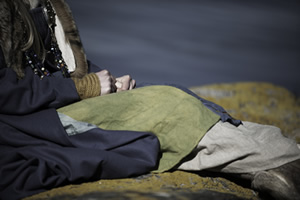
Fullas lovsang // Fulla’s Hymn
Think about the view early in the morning; the house where sisters, brothers, dogs and grandparents are sleeping, overlooking the sea, the mist is lifting, all is calm and beautiful. Troubles and quarrels are small compared to how well the great Goddess looks after us. Fulla is one of her aspects. You pray to her because she already knows all secrets, you don’t have to pretend anything.
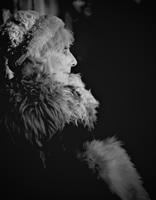
Tillbakeblikk // Looking Back
As Unn has got her whole family in Iceland, she sees to the wedding of her grandson Olav. When the ceremonies and feast have taken place in the great hall, she knows that this is her time to prepare for her own farewell; she goes into her chamber, remembers it all, summoning all her kin, then she dies.
Tor og Geirrød // Thor And Geirrød
When Thor is crossing the great mythical river Vimur, on his way to the giant Geirrød, he finds out that one of Geirrød’s daughters, Gjalp, is letting her water into the river from higher up the river. Nearly drowning, Thor manages to pull himself up by a branch from a rowan tree, from that day on called «Thor’s Saviour». He then wins the battle in Geirrød’s hall (a «kenning» of this: «wall-horse») by throwing a piece of iron through a house-pole as well as Geirrød.
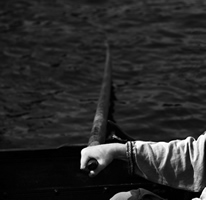
Ro Jevard // Row Jevard
The text is divided into two parts. The beginning and the end is a kind of invocation: «Row Jevard – come home». The part in between is inspired by writings on rune-stones. «The earl Jevard, longing for battles, went to Holmgaard (present city of Novgorod) «Rus» was called (Rus means a person from the eastern part of modern day Sweden. It is also the origin of the name Russia). «Celebrate those who got gold, but the honor is far greater».
Tyr og Fenrisulven // Tyr And Fenris The Wolf
Fenris is the wolf that the gods wouldn’t wish for if they had been able to choose again. Being the offspring of Loke they did accept him, so sweet and charming as a small puppy; however, growing to be gigantic, sinister and foul, he truly developed to be a beast and the threatful oncoming destroyer of Midgaard.
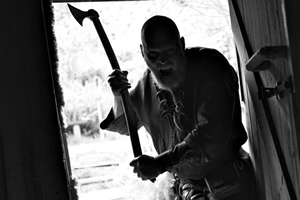
Tor gir svar på tinget // Thor Answering at Thing
A story about what The Viking Era much was all about. By archeological findings and scrutinizing the sources of place names, it seems clear that the cult of the god Thor was the predominant cult during this period. The cult of Odin is repressed and the cult of Thor is victorious in early Viking era times.
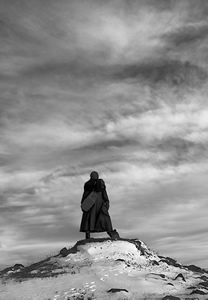
Som du seiler // As You Sail You will Return
Think of it as if all cultural expressions have a deeper meaning; there is no «entertainment». We still have the lullabies as a remnant of this. «As both you and I are sure in this moment that you will sail, we hereby make it equally certain that you will return», the meaning of the text is a sort of incantation,